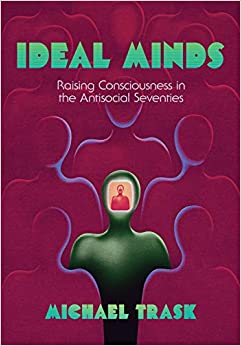The Book
Ideal Minds: Raising Consciousness in the Antisocial Seventies
The Author(s)
Michael Trask

Presenting a “dual literary and intellectual history” (27), Michael Trask contends that the 1970s saw “the revival of subjectivity in postmodern society” (1). He argues that seemingly disparate groups such as ethicists, radical ecologists, religious cults, New Wave science fiction writers, and evangelicals battled against “behaviorism … because it appeared to underwrite the [perceived] failed policies of the Great Society” (1) of the 1960s. They rejected utilitarianism, championed subjectivity and opposed centralized government power. By doing so, they helped prepare, wittingly or otherwise, the milieu for growing acceptance of free market ideologies and mistrust of statism, more often associated with economist Milton Friedman and Ronald Reagan. Trask contends that his chosen subjects emphasized the distinctiveness and sovereignty of the individual and denounced what they saw as an intrusive state utilitarianism that, indifferent to individuality, sought to impose its limitless conception of the public good.
Developing his argument in four chapters, he draws on an impressively wide range of sources from philosophy, literature, political theory, sociology and economics. The first chapter addresses artificial intelligence and the rise of meritocracy. Task contends that while mental testing seemed to affirm individual differences “that behaviorism appeared to deny” (33), to its critics “meritocracy offers no respite from the perpetual surveillance of utilitarian spectators over their wards” (58). His second chapter argues that in rejecting unchecked economic growth, radical ecologists took “aim less at the capitalist marketplace than at the coercions of runaway statism” (74). They also affirmed that “Only by reducing our numbers… can we recover our primal sense of individualism” (79).
Focused on 1970s cults such as Scientology and the Children of God, the third chapter claims that cults “attached themselves to the antiestablishment rhetoric that movements like anarchism and libertarianism favored” (109) and acted as “something of a testrun for” libertarian resurgence (101). Shifting his attention somewhat awkwardly to Milton Friedman, Trask notes that Friedman believed that the market would protect minorities and justify the removal of legal protections from them. The withering of the state and the triumph of the market would, Friedman believed, respect individual dignity and empower people to live as they chose, without the state making decisions for and on behalf of them. Examining the implications of subjectivity’s revival in subsequent decades, Trask asserts in his final chapter that resurgent fundamentalist Christianity and “New Age Spirituality” exhibited “the primacy of subjectivity” (138). Alongside his emphasis on a reaction against 1960s behaviorism and utilitarianism, he suggests that 1960s consciousness raising had “an appeal to subjectivity” that connected it with individualistic “celebrations of unfettered power” (179), free from state control and regulation, that marked the 1970s.
Summarizing the book’s argument, Trask contends that “the antistatist seventies sought to announce alternatives to what Ronald Reagan incessantly called ‘big government.’” Although “meritocracy, communitarianism, anarchism and … individualism” did not “readily reduce to a defense of the free market” they had “features comparable with such a defense” (173). Task’s inclusion of meritocracy does not sit well with his earlier observation that its detractors linked meritocracy with utilitarianism, the target of subjectivity’s scorn.
Elsewhere, Task sometimes acknowledges difficulties in asserting thematic commonalities among the many otherwise dissimilar groups and individuals that provide his evidence base. He concedes that “In some cases, such as population restriction and resource consumption, ecologists even advocate the sort of coercive state intervention to which antiutilitarian philosophers object” (67). “Diagnosing the cult as symptomatic of a free market run amok” (101), Task dismisses notions that cults brainwashed their converts. Yet, he also refers to “mind-control” cults (4). Many cults, such as that of Jim Jones, had centralizing, autocratic tendencies that sought to strip people of their autonomy and circumscribed their activities. Task sometimes states his intention to be clear, but, more suited to the specialist than the general reader, his exposition can be challenging. Consider, for example, the phrase “rehearses as ontogeny the phylogenetic shift in the disciplines of mind from a Skinnerian paradigm of observed reactions to a cognitivism that foregrounds mental processes” (104). Addressed in only 189 pages of text, Task’s wide range of examples sometimes permit no more than a brief explanation and discussion, and tend to assume the reader’s prior familiarity with them. Surprisingly, given his exploration of individualism and subjectivity, Task does not engage with Peter Clecak’s argument that a wide-ranging pursuit of personal fulfilment in the 1970s flowed from 1960s social and cultural change.[1]
[1] Peter Clecak, America’s Quest for an Ideal Self: Dissent and Fulfillment in the 60s and 70s (New York: Oxford University Press, 1983).
About the Reviewer
Mark Newman is reader in History at the University of Edinburgh with particular interests in the twentieth-century American South, religion and race, and African American history. His most recent books are Desegregating Dixie: The Catholic Church in the South and Desegregation, 1945-1992 and Black Nationalism in American History: From the Nineteenth Century to the Million Man March.

0